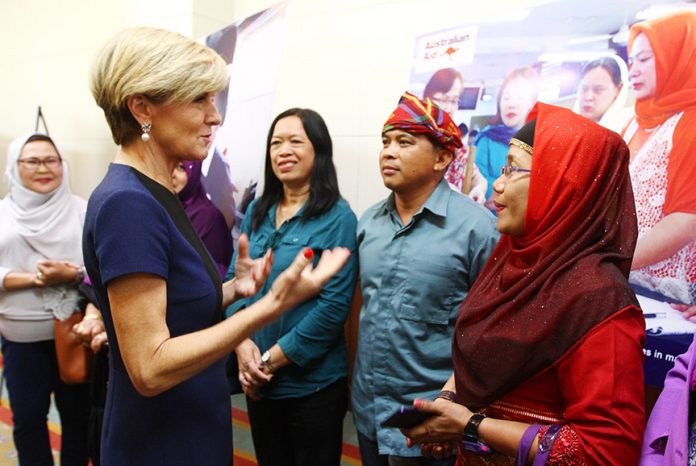
DAVAO CITY – Australian Foreign Minister Julie Bishop on Friday announced that her government is giving the Philippines some A$40 million for the peace efforts in Mindanao and another A$90 million for education development in the Autonomous Region in Muslim Mindanao.
During the launch of the Pathways Education Project at the Marco Polo hotel Davao on Friday, she said Australia wanted to get more involved in the development of Mindanao by supporting the government’s peace initiatives.
She said the $40 million would be for the development projects in conflict-affected areas, including water supply, infrastructure, and “things that local people need to get ahead and get on their lives.”
She said the Australian government provide technical assistance to ensure the success of the peace process.
The government has reopened peace negotiations with the National Democratic Front of the Philippines (NDFP), and is eyeing to conclude the peace process with the Moro National Islamic Front through the passage of the Bangsamoro Basic Law that was sidelined during the previous Congress.
It is also trying to address the issues raised by the Moro National Liberation Front in relation to the 1996 Final Peace Agreement.
“With the support for education, with the support for peace process, in this way, Australia continues to be a friend, a partner of the Philippines,” Bishop said.
Presidential Adviser on the Peace Process Secretary Jesus Dureza thanked the Australian government for the support to the country’s peace efforts.
“This is something very new. I almost fell down form my chair. What we are doing in peace-building, getting the agreements signed is just one half of the story; the other half is how to make it sustainable and work for education is very important,” he said.
The assistance, he said, was timely, as Communist Party of the Philippines founding chair Jose Maria Sison has agreed to jointly implement development programs along with the peace negotiations.
“In my negotiations with Joma, he agreed there would be development projects. In fact, they want it already while still negotiating. It will be done through agencies that they are inviting,” he said.
Dureza said they want to implement programs immediately because it may take some time if it will be done after the signing of a peace agreement.
“It provides the umbilical cord, dili pwede magbuwag ta kay nakatali kana nako (we cannot just separate because we are tied together) because of the development (programs). People will have to benefit early on the so-called dividends of peace,” he said.
He said that they are planning to put up a Mindanao Peace and Development Trust Fund that will replace the Mindanao Trust Fund (MTF) after 12 years of its implementation beginning 2005.
Ending July 2017, the MTF is a multi-donor grant facility established in 2005 to consolidate international development assistance for the socioeconomic recovery of conflict-affected communities in Mindanao.
The MTF funds programs and projects that promote economic opportunity, provide access to basic services and build social cohesion to help create stable and secure communities.
The MTF works with, among others, the Office of the Presidential Adviser on the Peace Process, Bangsamoro Development Agency and the World Bank as trust fund secretariat.
Dureza said that he sough help from the United Nations Development Programme to serve as the fund manager.
Education assistance
Bishop said the Australian government will allocate some A$90 million for education development in the ARMM as a key to the region’s prosperity.
“We are particularly focused with our development program and supporting people gain a basic education. Indeed, Australia has been indeed the largest development part of the Philippines and in Mindanao in education sector,” she said.
She said they aim to improve teachers’ quality, curriculum development, policy development as well as in other areas where they can assist in boosting education standards.
“We term the Australian-Philippines relationship as a comprehensive partnership and I think that it is quite evident that it is a long standing relation that covers many different aspects of government, business, and of course, people-to-people links,” she said.
In a briefer, it said that Australia’s investment will improve equity and performance in basic education by children in the ARMM that will contribute to more resilience, stability, peace and prosperity in the region.
Bishop said Australia is a longstanding and trusted development partner of the country in the education sector.
The Australian government has supported the Basic Education Assistance to Mindanao (BEAM) from 2002 to 2009; the Philippines Response to Indigenous Peoples’ and Muslim Education program from 2011 to 2014; and BEAM-ARMM from 2012 to 2017.
National Economic Development Authority Director General Ernesto Pernia acknowledged the support of the Australian government.
“The Philippines thanks and lauds the Australia for support to the country, particularly in improving delivery of basic education to Muslim school children through PATHWAYS,” he said.
He said PATHWAYS is essential in attaining the government’s goal of building secure, comfortable, and strongly rooted lives for all Filipino people.
He added that NEDA has finished the Philippine Development Plan 2017 to 2022 that highlights the need to ensure that communities in conflict-affected and vulnerable areas receive adequate protection. (Antonio L. Colina IV/MindaNews)






